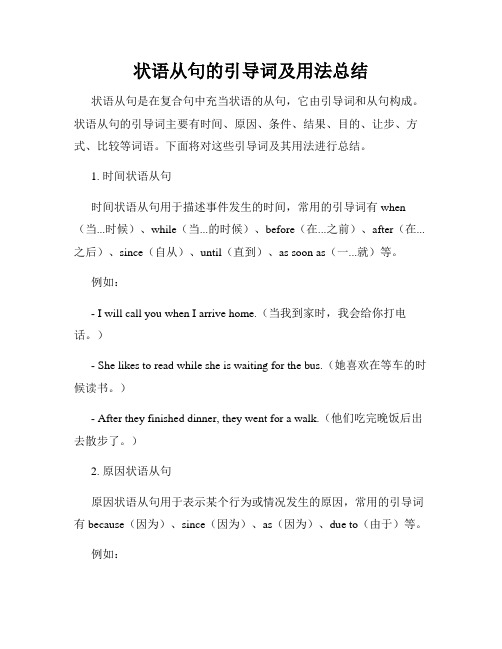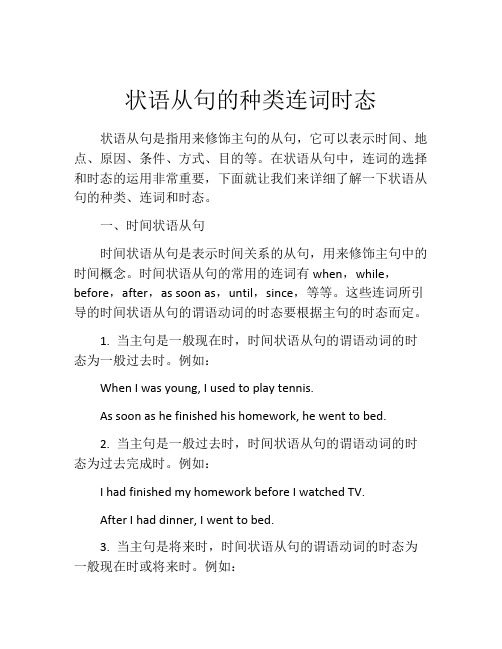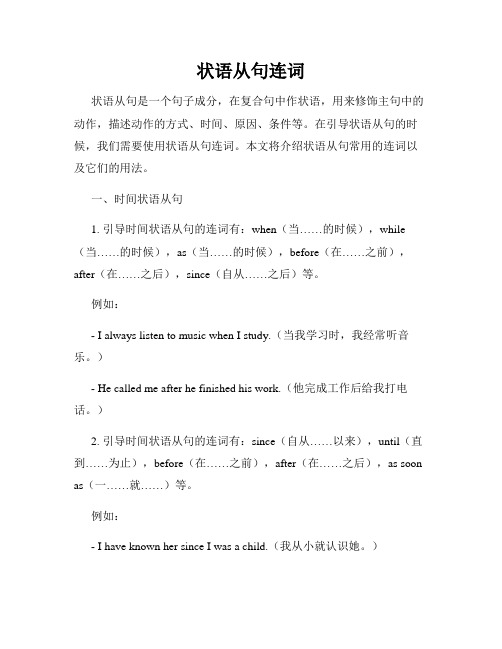时间原因条件状语从句
状语从句的条件和时间关系解析

状语从句的条件和时间关系解析状语从句是复合句中的一种从属成分,用来修饰主句中的动作或状态。
状语从句可以表示条件、时间、原因、目的、结果等关系。
在本文中,我们将重点探讨状语从句在条件和时间关系中的应用。
通过分析状语从句的用法和例子,我们可以更好地理解状语从句的条件和时间关系。
一、条件关系在表达条件关系时,状语从句一般与主句之间存在着一种前后因果关系。
具体的条件关系有以下几种:1. 如果/假如/要是...,就...例如:如果你明天来我家,我就给你准备好晚饭。
在这个例子中,状语从句“如果你明天来我家”表示条件,主句“我就给你准备好晚饭”表示结果。
2. 除非...,否则...例如:除非你努力学习,否则你不会通过考试。
在这个例子中,“除非你努力学习”是状语从句表示条件,“否则你不会通过考试”是主句表示结果。
3. 只要...,就...例如:只要你努力,就一定能成功。
在这个例子中,“只要你努力”是状语从句表示条件,“就一定能成功”是主句表示结果。
二、时间关系状语从句在时间关系中主要用来表示主句中的动作或状态发生的时间。
常用的时间关系有以下几种:1. 当...时/每当...例如:当他看到那个小孩的时候,他立刻上前帮助了他。
在这个例子中,“当他看到那个小孩的时候”是状语从句表示时间,“他立刻上前帮助了他”是主句表示动作。
2. 一直到...才...例如:我等了好几个小时,一直到天黑才回家。
在这个例子中,“一直到天黑”是状语从句表示时间,“我等了好几个小时,才回家”是主句表示动作。
3. 在...之前/之后...例如:在我们离开之前,请确保所有的灯都关闭。
在这个例子中,“在我们离开之前”是状语从句表示时间,“请确保所有的灯都关闭”是主句表示动作。
总结:通过以上的例子,我们可以看出,状语从句在表示条件和时间关系时,能够很好地连接主句与从句,使句子结构紧凑,表达清晰。
熟练运用状语从句,可以使文章更丰富多样,也可以增强语言表达的准确性。
状语从句的引导词及用法总结

状语从句的引导词及用法总结状语从句是在复合句中充当状语的从句,它由引导词和从句构成。
状语从句的引导词主要有时间、原因、条件、结果、目的、让步、方式、比较等词语。
下面将对这些引导词及其用法进行总结。
1. 时间状语从句时间状语从句用于描述事件发生的时间,常用的引导词有when (当...时候)、while(当...的时候)、before(在...之前)、after(在...之后)、since(自从)、until(直到)、as soon as(一...就)等。
例如:- I will call you when I arrive home.(当我到家时,我会给你打电话。
)- She likes to read while she is waiting for the bus.(她喜欢在等车的时候读书。
)- After they finished dinner, they went for a walk.(他们吃完晚饭后出去散步了。
)2. 原因状语从句原因状语从句用于表示某个行为或情况发生的原因,常用的引导词有because(因为)、since(因为)、as(因为)、due to(由于)等。
例如:- She couldn't come to the party because she was sick.(她因为生病所以不能来参加派对。
)- He couldn't concentrate on his work since he was tired.(他因为累了无法集中精力工作。
)- As it was raining heavily, we decided to stay at home.(由于下着大雨,我们决定待在家里。
)3. 条件状语从句条件状语从句用于描述某种条件下的情况,常用的引导词有if(如果)、unless(除非)、as long as(只要)、provided/providing that(只要)、in case(万一)等。
第03讲 时间、条件和原因状语从句(解析版)-九年级英语(牛津译林版)

第03讲时间、条件和原因状语从句九年级英语(译林牛津版)【基础知识】在复合句中,做状语成分的从句叫状语从句。
常见的状语从句可分为:时间、条件、地点、原因、方式、让步、比较、结果、目的等从句,由不同的引导词引导。
考点一:时间状语从句引导词用法例句when when引导的时间状语从句中既可接延续性动词,也可接非延续性动词,多用一般过去时They were talking happily when I walked past the door.当我从门前走过,他们正在开心地聊天。
while while强调主句和从句动作同时发生,所引导的时间状语从句只能用延续性动词,多用进行时态。
My mother was cooking while I was doing my homework.当妈妈在做饭的时候,我在做作业。
not … until主句的谓语动词为非延续性动词,主句要用否定式,从句用肯定式。
The bus won’t start until everybody gets on.公共汽车直到每个人都上车才会发动。
since 主句谓语动词一般用现在完成时,从句谓语动词一般用一般过去时。
Five yeas has passed since we saw each other last time. 距离我们上次见面已经五年过去了。
before before 引导的从句表示主句的动作发生在从句动作之前。
We turned off the light before we left. 我们在离开前关了灯。
after after 引导的从句表示主句的动作发生在从句动作之后。
He went to bed after he finished his work. 他做完工作后就去睡觉了。
as soon as 若主句为一般将来时,从句常用一般现在时表将来。
I will tell him the news as soon as I see him. 我一看见他,就会告诉他这个消息。
状语从句的种类连词时态

状语从句的种类连词时态状语从句是指用来修饰主句的从句,它可以表示时间、地点、原因、条件、方式、目的等。
在状语从句中,连词的选择和时态的运用非常重要,下面就让我们来详细了解一下状语从句的种类、连词和时态。
一、时间状语从句时间状语从句是表示时间关系的从句,用来修饰主句中的时间概念。
时间状语从句的常用的连词有when,while,before,after,as soon as,until,since,等等。
这些连词所引导的时间状语从句的谓语动词的时态要根据主句的时态而定。
1. 当主句是一般现在时,时间状语从句的谓语动词的时态为一般过去时。
例如:When I was young, I used to play tennis.As soon as he finished his homework, he went to bed.2. 当主句是一般过去时,时间状语从句的谓语动词的时态为过去完成时。
例如:I had finished my homework before I watched TV.After I had dinner, I went to bed.3. 当主句是将来时,时间状语从句的谓语动词的时态为一般现在时或将来时。
例如:I will call you as soon as I arrive in Shanghai.He will stay in New York until he finds a job.二、地点状语从句地点状语从句是表示地点关系的从句,用来修饰主句中的地点概念。
地点状语从句的常用的连词有where,wherever,等等。
这些连词所引导的地点状语从句的谓语动词的时态一般和主句保持一致。
例如:I will meet you where we agreed.Wherever you go, I will follow you.三、原因状语从句原因状语从句是表示原因关系的从句,用来修饰主句中的原因概念。
状语从句连词

状语从句连词状语从句是一个句子成分,在复合句中作状语,用来修饰主句中的动作,描述动作的方式、时间、原因、条件等。
在引导状语从句的时候,我们需要使用状语从句连词。
本文将介绍状语从句常用的连词以及它们的用法。
一、时间状语从句1. 引导时间状语从句的连词有:when(当……的时候),while (当……的时候),as(当……的时候),before(在……之前),after(在……之后),since(自从……之后)等。
例如:- I always listen to music when I study.(当我学习时,我经常听音乐。
)- He called me after he finished his work.(他完成工作后给我打电话。
)2. 引导时间状语从句的连词有:since(自从……以来),until(直到……为止),before(在……之前),after(在……之后),as soon as(一……就……)等。
例如:- I have known her since I was a child.(我从小就认识她。
)- I will call you as soon as I arrive at the airport.(我到达机场后立即给你打电话。
)二、地点状语从句引导地点状语从句的连词有:where(在哪里),wherever(无论在哪里)。
例如:- He goes to the park where he can play basketball.(他去那个可以打篮球的公园。
)- You can find her wherever you go.(无论你去哪里都可以找到她。
)三、原因状语从句引导原因状语从句的连词有:because(因为),since(既然,因为),as(因为)。
例如:- She couldn't come to the party because she was busy.(她无法参加聚会,因为她很忙。
状语从句

7.比较状语从句 由than、as…as引导。如: Jim is taller than me. 吉姆比我高。 Lucy jumps as far as Lily. 露茜和莉莉跳得一样远。 8.方式状语从句 由as、as if等引导。如: Please do as I do. 请像我这样做。 She lay down as if she was ill. 她躺着似乎是病了。 9.让步状语从句。 通常由though、although、even if、Whatever等 引导。如: There is air around us, though we can't see it. 我们周围都是空气,尽管我们看不到。
Байду номын сангаас
(改错)
《中考指导》
中考考点2: if表 “是否”引导宾语从句可用将来时. C 考题:I don’t know if he __. If he __ , I’ll tell you. A. will come, will come B. comes, will come C. will come, comes D. comes, come 《中考指导》 中考考点3: “祈使句 + and (or)+ 陈述句” 在意思上相 当 于一个带有条件状语从句的复合句。
中考考点3:※※※while从句用进行时 were readinng e.g.1) My parents _______________ (read) some newspapers while I ____________ (play) with my e-dog this was playing time yesterday.《中考指导》 2) While we ____________ (travel) in were travelling Australia last year, I visited Lucy who once taught English in our school. (上海市2004)
八种状语从句
八种状语从句状语从句在句中作状语,修饰主句中的动词、形容词和副词等。
按其作用和意义可分为时间、原因、目的、结果、条件、让步、方式、比较八种。
下面对这八种从句的要点加以总结。
一、各类状语从句的引导词及易混词的区别。
1. 时间状语从句1) 引导词(1)表示“当……时候”:when, while, as, whenever(2)表示“一……就……”:as soon as(3)其它:after, before, since, until, by the timeWhenever he comes, he brings a friend. 他每次来都带个朋友。
I want to see him as soon as he arrives. 他一来我就要见他。
I went to bed after I finished my homework. 我做完家庭作业之后才睡觉。
2) 易混引导词when, while, as 的区别when既可指“时间点”,与瞬时动词连用,也可指“时间段”,与延续性动词连用(这时可与while互换)。
如:When he came in, his mother was cooking. 他进来时,他妈妈正在烧饭。
When(While)we were at school, we went to the library every day. 我们在校求学时,每天都到图书馆去。
while 只表示时间段,因此while从句的谓语动词要用延续性动词。
Please don' t talk so loud while others are talking. 别人在工作时,切勿大声讲话。
as 与when 用法相似,但着重强调主句动作与从句动作同时发生,有“随着……”或“一边……一边……”之意。
She sang as she went along. 她边走边唱。
As you get older, you get more knowledge.随着年龄的增长,你获得的知识就越多。
完整版)状语从句(9种全)
完整版)状语从句(9种全)状语从句在复合句中起到修饰主句的作用,分为时间、地点、原因、目的、结果、条件、方式、比较、让步等种类。
1.时间状语从句时间状语从句的连接词包括when。
as。
while。
after。
before。
since。
ever since。
as soon as。
once。
till。
until。
whenever。
no sooner…than。
hardly/scarcely。
when。
the moment/minute/instant/second。
every time。
each time。
any time。
the first time。
next time。
last time。
all the time。
by the time。
directly。
immediately。
instantly等。
例如,“一···就···”的句型可以用as soon as或once引导,其中as soon as侧重时间或动作先后衔接紧,而once侧重条件,表示“一旦。
”;on doing sth/on one's + n.作时间状语,例如On arriving at the n。
the thief was arrested.意为“一到达车站,这个小偷就被逮捕了。
”2.地点状语从句地点状语从句的连接词包括where。
wherever。
anywhere。
everywhere等。
例如,I'll go wherever you go.意为“你去哪儿,我就跟你去哪儿。
”3.原因状语从句原因状语从句的连接词包括because。
since。
as。
now that。
seeing that。
considering that等。
例如,Since it's raining。
we'll stay indoors.意为“因为下雨,我们将待在室内。
英语状语从句的九种类型
英语状语从句的九种类型状语从句是英语语法中一个非常重要的部分。
它可以用来修饰主句的动词,形容词,副词等,从而使句子更加完整,更加准确。
在状语从句中,最常见的就是状语从句。
状语从句可以分为九种类型,分别是时间状语从句,条件状语从句,原因状语从句,目的状语从句,结果状语从句,让步状语从句,方式状语从句,比较状语从句和地点状语从句。
下面我们将对这九种类型进行详细的介绍。
一、时间状语从句时间状语从句用来表示主句中所描述的动作发生的时间,包括过去、现在和将来。
时间状语从句通常由时间连词引导,如when、while、as soon as、before、after、since、until、till等等。
例如:I will call you as soon as I arrive in Beijing.(我到北京后会立即给你打电话。
)He had finished his homework before he went to bed.(他睡觉前已经完成了作业。
)二、条件状语从句条件状语从句用来表示主句中的动作发生的条件或假设。
条件状语从句通常由if、unless、provided that、in case等引导。
例如: If it rains tomorrow, we will stay at home.(如果明天下雨,我们会呆在家里。
)Unless you study hard, you won't pass the exam.(除非你努力学习,否则你不会通过考试。
)三、原因状语从句原因状语从句用来表示主句中的动作发生的原因。
原因状语从句通常由because、since等引导。
例如:He didn't come to the party because he was sick.(他因为生病没有来参加聚会。
)Since it's raining outside, we can't go for a walk.(因为外面下雨,我们不能去散步。
状语从句的类型了解时间地点原因条件和方式状语从句
状语从句的类型了解时间地点原因条件和方式状语从句状语从句是一个句子中充当状语的从句,用来修饰其他句子中的动词、形容词或副词。
其中,状语从句又可分为时间状语从句、地点状语从句、原因状语从句、条件状语从句和方式状语从句。
本文将详细介绍这五种状语从句的类型、用法和示例。
一、时间状语从句时间状语从句是指用来表示时间关系的从句,常用的引导词包括when、while、before、after、as soon as等。
它们可以说明一个动作发生的时间、顺序或同时性。
示例1:When I was young, I used to play in the park every day.当我年轻的时候,我每天都在公园里玩耍。
示例2:After I finish this article, I will start working on my presentation.在我完成这篇文章之后,我将开始着手准备我的演讲稿。
二、地点状语从句地点状语从句用来表示动作发生的地点或方位,常用的引导词包括where、wherever等。
示例:Wherever you go, I will always be with you.无论你去哪里,我都会始终陪伴在你身边。
三、原因状语从句原因状语从句用来说明一个动作或事件的原因,常用的引导词有because、since、as等。
示例:He couldn't attend the meeting because he was sick.他因为生病无法参加会议。
四、条件状语从句条件状语从句用来表示某个条件下发生的动作,常用的引导词有if、unless、as long as等。
示例:If it rains tomorrow, we will stay at home.如果明天下雨,我们将呆在家里。
五、方式状语从句方式状语从句用来说明动作或事件的方式或方法,常用的引导词有as、as if、as though等。
- 1、下载文档前请自行甄别文档内容的完整性,平台不提供额外的编辑、内容补充、找答案等附加服务。
- 2、"仅部分预览"的文档,不可在线预览部分如存在完整性等问题,可反馈申请退款(可完整预览的文档不适用该条件!)。
- 3、如文档侵犯您的权益,请联系客服反馈,我们会尽快为您处理(人工客服工作时间:9:00-18:30)。
掌门1对1教育高中英语时间、原因、条件状语从句一.when, while 和as 引导时间状语从句的区别用法(一)when 的用法when 从句的A事件,相当于另一个事件B发生的时间点。
(也就是说,when 从句的重点不在动作本身发生的状态,而只是把它作为一个时间点,)所以when 多数情况下用的是一般过去时,则不用正在进行时。
(口头练习)When I got to the airport, the guests had left.Why do you want a new job when you have got such a good one already?(二)while 的用法while 从句的侧重点在于描述动作正在发生的状态,(它的意思是:当while 事件正在发生的时候,另一件事如何如何。
)所以,while 从句一般用的是正在进行时。
而另一件事的状态根据具体情况而定。
(口头练习)1. While my wife was reading the newspaper, I was watching TV.2. While Jim was mending his bike, Lin T ao came to see him. 从时间的角度来看,while 表示的是一段时间,是一个过程。
趁热打铁。
Strike while the iron is hot.(这句话中,是说趁着铁是热的这段时间,赶紧打铁。
如果换成when 意思就变了,相当于说铁只热了一下,打一下,然后铁就冷了。
这显然不符合文意。
)(三)as 的用法as 从句表示的也是一件事情正在发生,另一件事也正在进行当中。
as 从句用的一般不用正在进行时,而只是一般过去时。
可以翻译成“边……边……”。
(口头练习)As my mother sang those old songs, tears ran down her cheeks. The students took notes as they listened. as 表达的事件,往往只是主句动作发生的背景或条件时,as 只是一个次要的时间说明,常常翻译成“随着……”之意。
1. As the time went on,the weather got worse. 随着时间的推移,气候更加糟糕。
2. The atmosphere gets thinner and thinner as the height increases. 随着高度的增加,大气越来越稀薄。
(少数情况下,如果强调动作正在发生,as 从句也可以用正在进行时。
The sad mother sat on the roadside, shouting as she was crying. 伤心的妈妈坐在路边,边哭边叫喊。
)Exercise :1.the day went on, the weather got worse.2. Just I stopped my car , a man came up to me.3.the manager comes here for a visit next week, I’ll talk with him about this.4. —I'm going to the post office.— you're there, can you get me some stamps?Key: As When/as When While二.until 和till 的用法区别 肯定形式表示的意思是“做某事直至某时”,动词必须是延续性的。
否定形式表达的意思是“直至某时才做某事”。
动词为延续性或非延续性都可以。
肯定句:I slept until midnight.Wait till I call you.否定句:She didn't arrive until 6 o'clock.Don't get off the bus until it has stopped. 公共汽车停稳后再下车。
I didn't manage to do it until you had explained how. 直到你教我后,我才会做。
区别: until 可用于句首,而till 通常不用于句首;表示“直到…才”用untilUntil you told me, I had heard nothing of what happened. Not until…在句首,主句用倒装。
Man didn ’t know what heat is until the early years of the 19th century.Not until the early years of the 19th century did man know what heat is. Ididn ’t realize how much time I had wasted until I began to worl.Not until I began to work did I realize how much time I had wasted.三.表示“一……就……”的结构1.as soon as, once, directly, immediately, instantly, the moment, the instant, the minute2. hardly/scarcely…when/before, no sooner…than (主句常用过完)As soon as I got home, it began to rain.=I had hardly / scarcely got home when it began to rain.=I had no sooner got home than it began to rain.注意:如果hardly, scarcely 或no sooner 置于句首,句子必须用倒装结构。
Hardly / Scarcely had I got home when it began to rain.总结:1)as, when 引导短暂性动作的动词。
2)当从句的动作发生于主句动作之前,只能用when 引导这个从句3)从句表示“随时间推移”连词能用asNo sooner had I got home than it began to rain.3.Instantly, immediately, directlyI got up to open the door immediately the bell rang.4.The moment, the instant, the minuteWe thrilled with joy the very minute we set foot on the soil of our motherland.Exercise:Fill in the blanks with proper words.1._________ he comes tomorrow, I shall ask where he has been. 2._________ he was speaking, everybody listened carefully. 3.I saw her just _________ she was getting off the train. 4.Have a good look at that man _________ you pass him. 5.It was already eight o'clock _________ we got there.6. I was about to go out _________ a visitor came. 7.We'll go to the country at the beginning of June, ______ the summer harvest will start.8. He learned to speak German _________ he was in Berlin.9. Henry is in charge of the office ________ Mr. Smith is away. 10. I listen to the recorder _________ I have time. 11. He had learned Chinese _________ he came to China. 12. _________ the work was done, we sat down to sum up experience. 13. I haven't seen him _________ he moved to the other side of the town. 14. I waited ________ he came back. 15. It was not ________ he took off his eyeglasses that I recognized him. 16. She likes everything to be in place ________ she starts to work. 17. The thieves ran away _________ they caught sight of the police. 18. They decided to go back home _________ their money ran out. 19. We played outside till sunset, _________ it began to rain。
20. __________ I get to the airport, I will phone you to pick me up. 21. They were about to leave ______ it began to rain. 22. He always stay in bed ______ lunch time. 23. I like playing tennis _________ my younger sister prefers watching ball games. 24. _________ I understand your viewpoint, I don’t agree with you. 25. _______ she grew older, she became more responsible.Key: 1. When 2. While / When 3. as 4. when/as5. when 6. when7. when 8. while9. while10. whenever11. before 12. After 13. since 14. till/until15. until 16. before17. as soon as 18. before 19. when20. As soon as21.when 22. until 23. while24. While 25. As原因状语从句1.Because he was ill, he didn't go to school。
